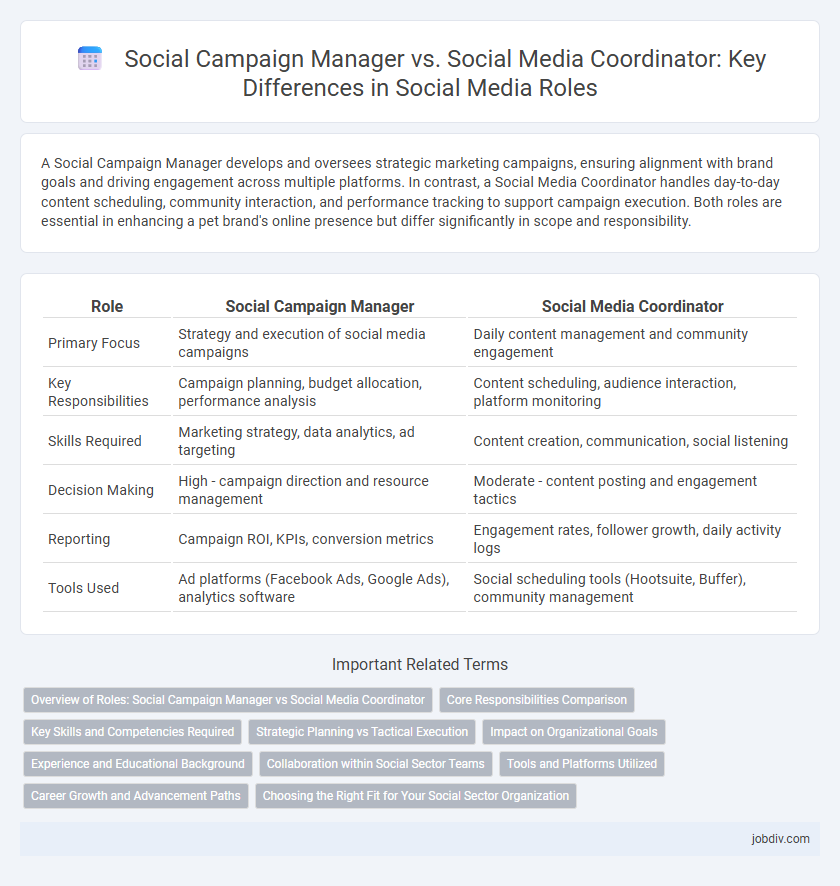A Social Campaign Manager develops and oversees strategic marketing campaigns, ensuring alignment with brand goals and driving engagement across multiple platforms. In contrast, a Social Media Coordinator handles day-to-day content scheduling, community interaction, and performance tracking to support campaign execution. Both roles are essential in enhancing a pet brand's online presence but differ significantly in scope and responsibility.
Table of Comparison
| Role | Social Campaign Manager | Social Media Coordinator |
|---|---|---|
| Primary Focus | Strategy and execution of social media campaigns | Daily content management and community engagement |
| Key Responsibilities | Campaign planning, budget allocation, performance analysis | Content scheduling, audience interaction, platform monitoring |
| Skills Required | Marketing strategy, data analytics, ad targeting | Content creation, communication, social listening |
| Decision Making | High - campaign direction and resource management | Moderate - content posting and engagement tactics |
| Reporting | Campaign ROI, KPIs, conversion metrics | Engagement rates, follower growth, daily activity logs |
| Tools Used | Ad platforms (Facebook Ads, Google Ads), analytics software | Social scheduling tools (Hootsuite, Buffer), community management |
Overview of Roles: Social Campaign Manager vs Social Media Coordinator
Social Campaign Managers develop and execute comprehensive marketing strategies across various social platforms to drive engagement and achieve campaign goals. Social Media Coordinators focus on content creation, scheduling, and daily community management to maintain active brand presence. These roles differ primarily in strategic scope, with Campaign Managers steering long-term initiatives and Coordinators managing day-to-day social interactions.
Core Responsibilities Comparison
A Social Campaign Manager is responsible for strategizing, planning, and executing comprehensive social media campaigns to drive brand awareness and achieve marketing goals, while a Social Media Coordinator primarily focuses on content creation, scheduling, and community engagement to maintain daily social media presence. Campaign Managers analyze performance metrics and optimize campaigns across multiple platforms, whereas Coordinators manage interactions, respond to comments, and support the content calendar. Both roles collaborate closely but differ in their scope, with Campaign Managers prioritizing strategy and analytics, and Coordinators emphasizing operational execution and audience interaction.
Key Skills and Competencies Required
A Social Campaign Manager must excel in strategic planning, data analysis, and budget management to design and execute effective multi-channel campaigns that drive engagement and conversions. In contrast, a Social Media Coordinator requires strong content creation abilities, community management skills, and proficiency with social media platforms and scheduling tools to maintain brand presence and foster audience interaction. Both roles demand excellent communication and adaptability, but the Campaign Manager leans heavily on leadership and analytical competencies, while the Coordinator focuses on tactical execution and daily platform management.
Strategic Planning vs Tactical Execution
A Social Campaign Manager emphasizes strategic planning, developing comprehensive social media campaigns that align with overall marketing goals and target audience insights. In contrast, a Social Media Coordinator focuses on tactical execution, managing daily content scheduling, community engagement, and real-time platform monitoring. The manager drives long-term objectives and analytics-driven adjustments, while the coordinator ensures consistent, on-the-ground implementation of social strategies.
Impact on Organizational Goals
A Social Campaign Manager drives organizational goals by creating strategic social media campaigns that increase brand awareness and generate leads, directly impacting revenue growth. A Social Media Coordinator supports these initiatives by managing daily content and community engagement, ensuring consistent messaging and audience interaction. Both roles contribute to achieving key performance indicators but differ in scope, with the manager focusing on high-level strategy and the coordinator on execution.
Experience and Educational Background
Social Campaign Managers typically possess 3-5 years of experience in digital marketing and campaign strategy, often holding a bachelor's degree in marketing, communications, or a related field. Social Media Coordinators usually have 1-3 years of experience focused on content creation and community engagement, with educational backgrounds ranging from marketing diplomas to bachelor's degrees. Both roles benefit from certifications in social media management platforms and analytics tools, enhancing their strategic and operational effectiveness.
Collaboration within Social Sector Teams
Social Campaign Managers lead strategic planning and execution, ensuring alignment across marketing, communications, and community outreach teams to maximize impact. Social Media Coordinators support this effort by managing day-to-day content creation, audience engagement, and real-time social listening, facilitating seamless communication within social sector teams. Effective collaboration between these roles drives cohesive messaging and amplifies social campaign outcomes through synchronized efforts and shared insights.
Tools and Platforms Utilized
Social Campaign Managers leverage advanced analytics platforms like Google Analytics, HubSpot, and Hootsuite to design and track multi-channel campaigns, ensuring precise targeting and ROI measurement. Social Media Coordinators primarily use tools such as Buffer, Canva, and native social media management interfaces like Facebook Creator Studio to curate content and engage audiences daily. Both roles rely on collaboration tools like Slack and Trello, but their focus varies, with Managers prioritizing strategic campaign execution and Coordinators emphasizing content scheduling and community interaction.
Career Growth and Advancement Paths
A Social Campaign Manager typically oversees strategy and analytics, offering greater opportunities for career advancement into roles like Digital Marketing Director or Brand Manager. Social Media Coordinators often handle content creation and day-to-day community management, serving as a foundational role that can lead to specialized positions such as Content Strategist or Social Media Analyst. Both pathways provide skill development, but the managerial route generally offers faster progression and higher salary potential.
Choosing the Right Fit for Your Social Sector Organization
A Social Campaign Manager typically oversees strategic planning, execution, and analytics of large-scale social media campaigns, making them ideal for organizations aiming for wide-reaching impact and data-driven results. In contrast, a Social Media Coordinator handles daily content creation, community engagement, and platform management, fitting organizations focused on maintaining consistent brand presence and direct audience interaction. Selecting the right role depends on your social sector organization's goals, whether prioritizing strategic campaign leadership or operational social media tasks.
Social Campaign Manager vs Social Media Coordinator Infographic

 jobdiv.com
jobdiv.com